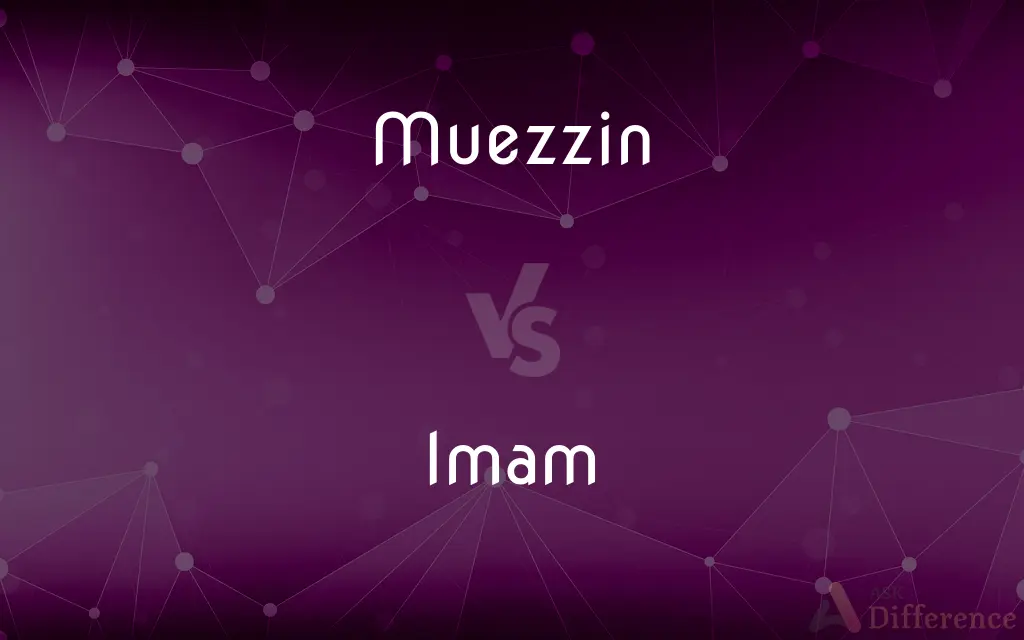Muezzin vs. Imam — What's the Difference?
By Tayyaba Rehman & Urooj Arif — Updated on May 6, 2024
Muezzin calls Muslims to prayer from a mosque's minaret; Imam leads the prayers and provides spiritual guidance.

Difference Between Muezzin and Imam
Table of Contents
ADVERTISEMENT
Key Differences
The muezzin has a specific role of calling the faithful to prayer, traditionally from a mosque’s minaret, signaling the time for daily prayers. Whereas the imam serves as the prayer leader and may also deliver sermons and provide community leadership.
While the muezzin’s primary duty is the call to prayer, known as the Adhan, and he may be known for his vocal abilities, the imam is often expected to have extensive knowledge of the Quran and Islamic law.
In many Muslim communities, the muezzin is chosen for his strong, melodious voice and ability to recite the call to prayer clearly. On the other hand, an imam is selected based on his scholarly understanding and ability to interpret Islamic teachings.
Muezzins typically perform their duties at specific times, coinciding with the five daily prayer times in Islam. Conversely, imams often have broader responsibilities, including leading prayers, counseling community members, and sometimes managing mosque affairs.
While the role of the muezzin can be more singular and focused, the role of an imam is diverse, often encompassing educational duties and community leadership, reflecting their pivotal role in the spiritual and social life of their community.
ADVERTISEMENT
Comparison Chart
Primary Role
Calls to prayer
Leads prayers and sermons
Skills Required
Strong vocal abilities
Scholarly knowledge of Islam
Duties Timing
Fixed times (prayer times)
Varied, includes community work
Education
Less focus on scholarly education
Typically highly educated in Islamic studies
Community Interaction
Limited to call to prayer
Extensive, including counseling
Compare with Definitions
Muezzin
Role is vital for maintaining prayer discipline in a community.
The muezzin's call reminded everyone it was time to pause and pray.
Imam
Often involved in educational roles within the community.
The imam taught daily classes on the Quran and Hadith.
Muezzin
May work closely with the imam but does not lead prayers.
The muezzin completed the call, and then the imam stepped forward to lead the prayers.
Imam
Acts as a scholar and a reference in Islamic law.
When there were questions about dietary laws, the community turned to the imam for guidance.
Muezzin
A person appointed at a mosque to lead and recite the call to prayer.
The muezzin's voice echoed throughout the neighborhood at dawn.
Imam
May deliver sermons and lectures.
The imam's Friday sermon addressed important societal issues.
Muezzin
Known for vocal clarity and strength.
The muezzin practiced to ensure his call to prayer was clear and melodious.
Imam
The religious leader of a mosque who leads the prayers.
The imam led the community in solemn prayer during the service.
Muezzin
Traditionally performs the Adhan from a minaret.
Visitors watched the muezzin make the call from the towering minaret.
Imam
Provides spiritual and moral guidance to the community.
The imam regularly counseled young members of the community.
Muezzin
The muezzin (Arabic: مُؤَذِّن) is the person who proclaims the call to the daily prayer (ṣalāt) five times a day (Fajr prayer, Zuhr prayer, Asr prayer, Maghrib prayer and Isha prayer) at a mosque. The muezzin plays an important role in ensuring an accurate prayer schedule for the Muslim community.
Imam
Imam (; Arabic: إمام imām; plural: أئمة aʼimmah) is an Islamic leadership position. It is most commonly used as the title of a worship leader of a mosque and Muslim community among Sunni Muslims.
Muezzin
The crier who calls the faithful to prayer five times a day.
Imam
In law and theology, the caliph who is successor to Muhammad as the lawful temporal leader of the Islamic community.
Muezzin
(Islam) The person who issues the call to prayer from one of the minarets of a mosque.
Imam
The male prayer leader in a mosque.
Muezzin
A Mohammedan crier of the hour of prayer; the Moslem official of a mosque who summons the faithful to prayer from a minaret five times a day.
Imam
The Muslim worshiper who leads the recitation of prayer when two or more worshipers are present.
Muezzin
The Muslim official of a mosque who summons the faithful to prayer from a minaret five times a day
Imam
In Twelver Shia belief, any of 12 descendants of Muhammad regarded as divinely appointed spiritual and temporal leaders.
Imam
A ruler claiming descent from Muhammad and exercising authority in an Islamic state.
Imam
Any of the founders of the four schools of law and theology.
Imam
An authoritative scholar who founds a school of law or theology.
Imam
Used as a title for an imam.
Imam
One who leads the salat prayers in a mosque.
Imam
(usually capitalized) A Shi'ite Muslim leader descended from the prophet Muhammad and functioning as his spiritual successor.
Imam
One of the Twelve imams, descendants of Muhammad from the seventh to ninth centuries {{CE}} who lived exemplary lives.
Imam
Among the Mohammedans, a minister or priest who performs the regular service of the mosque.
Imam
A Mohammedan prince who, as a successor of Mohammed, unites in his person supreme spiritual and temporal power.
Imam
(Islam) the man who leads prayers in a mosque; for Shiites an imam is a recognized authority on Islamic theology and law and a spiritual guide
Common Curiosities
How does one become a muezzin?
Becoming a muezzin generally requires a strong, clear voice and the ability to recite the Adhan correctly.
What qualifications are necessary for an imam?
An imam typically needs to be well-versed in the Quran, Hadith, and Islamic law.
What is the primary duty of a muezzin?
The primary duty of a muezzin is to call the faithful to prayer five times a day.
Does the muezzin participate in leading the prayers?
No, the muezzin does not lead the prayers; that is the role of the imam.
Can an imam be appointed if he has no formal education in Islamic studies?
While formal education in Islamic studies is highly preferred, community trust and recognized knowledge of Islamic practices can also qualify someone to be an imam in some cases.
What qualities are most important for a muezzin?
Key qualities for a muezzin include reliability, a good sense of timing, and a strong, clear voice capable of reciting the Adhan melodiously.
Is there a specific dress code for muezzins and imams during their duties?
Both muezzins and imams are expected to adhere to Islamic dress codes, which emphasize modesty, during their duties. Specific attire can vary based on cultural norms.
Can a muezzin also be an imam?
Yes, a muezzin can also serve as an imam if he possesses the required knowledge and qualifications.
Is the role of a muezzin considered a full-time job?
In many communities, the role of a muezzin can be either a full-time or part-time position, depending on the size of the community and the mosque's resources.
How often does a muezzin call to prayer?
A muezzin calls to prayer five times each day, corresponding to the daily prayer times in Islam.
What educational background is common for imams?
Imams often have formal education in Islamic studies, which includes studying the Quran, Hadith (sayings of the Prophet Muhammad), jurisprudence, and theology.
How do imams contribute to community life outside of religious duties?
Imams often play significant roles in community counseling, conflict resolution, educational programs, and sometimes even in local or broader political discussions.
What happens if a muezzin is unavailable to call to prayer?
If a muezzin is unavailable, another person with knowledge of the Adhan may perform the call to prayer. In some mosques, recordings or automated calls to prayer are used as backups.
Can women serve as muezzins or imams?
In most Islamic traditions, these roles are typically held by men; however, there are instances and specific communities where women have been known to take on these roles, particularly in progressive or reformist Muslim communities.
What is the relationship between the muezzin and the community?
While the muezzin's interaction with the community is primarily through the call to prayer, this role is crucial in maintaining the spiritual rhythm of the community's daily life and is highly respected.
Share Your Discovery

Previous Comparison
Task vs. Undertaking
Next Comparison
Boot vs. BoothAuthor Spotlight
Written by
Tayyaba RehmanTayyaba Rehman is a distinguished writer, currently serving as a primary contributor to askdifference.com. As a researcher in semantics and etymology, Tayyaba's passion for the complexity of languages and their distinctions has found a perfect home on the platform. Tayyaba delves into the intricacies of language, distinguishing between commonly confused words and phrases, thereby providing clarity for readers worldwide.
Co-written by
Urooj ArifUrooj is a skilled content writer at Ask Difference, known for her exceptional ability to simplify complex topics into engaging and informative content. With a passion for research and a flair for clear, concise writing, she consistently delivers articles that resonate with our diverse audience.













































